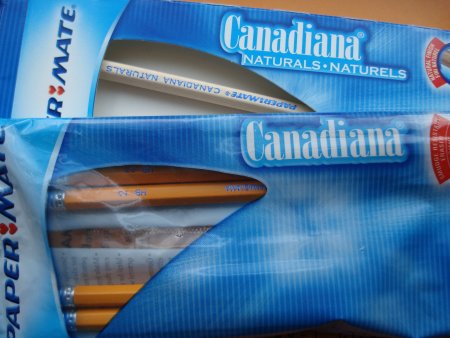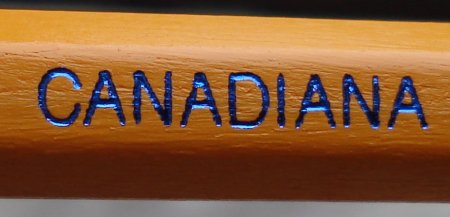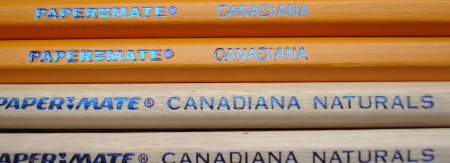
The name is pure marketing, since the pencils are not Canadian in any meaningful way. Sold in Canada by Papermate, a brand of Sanford, which is a division of Newell Rubbermaid, these are everyday office pencils.
They are offerered in two varieties – a typical yellow office pencil finish, and an unvarnished “Naturals” version.

There is one immediately noticeable aspect to these pencils – the wood is extremely white. It is my understanding that most cedar used in pencils today is dyed pink/red, to make it appear similar to the Eastern Red Cedar of years past.

These pencils don’t claim to be cedar, yet they do sharpen just as easily. They also state “Does not contain rainforest wood”. So what wood are they? Hmmm.
The Canadiana cellophane package has a number of claims:
– Smudge resistant eraser for clean removal of pencil marks
– Made from real wood for easy sharpening
– Ideal for schoolwork and general writing
The Canadian Naturals box has some slightly different claims:
– Made from unlacquered wood for a natural feel
– Sharpens easily
– Non-smudge eraser for clean removal of pencil marks
The pencils are quite usable, with a dark, sufficiently smooth (and non-crumbling) though unremarkable lead. The eraser works quite well.
The “Naturals” version seems to be a reasonable compromise between overly finished natural pencils, and those that are a bit too raw.
Overall, I guess they are not bad as office pencils.


They do go blunt very quickly, though.
Sheer marketing! These pencils are called “American” in the U.S.A. The American’s lead is too smudgy for me, and the erasers so horrible that I tore them off. Eventually I just gave them all away.
Yeah, I don’t really like the American either. I wonder how different they are.
Looks just like the papermate American imo. The lead in the Papermate American is quite rough, even though it is pretty dark.
What is it with Sanford anyway, they either make lead too dark and scratchy (Papermate American) or too light and smooth (Mirado)..
You’re all correct this is the exact same pencil as the American which was originally an Eberhard Faber brand. They are produced in the same factory in Lewisburg, TN.
The wood sourcing policy at Sanford for this pencil is to use the lowest cost wood available that will provide for a functional pencil. This means the wood in the American and the Canadiana will vary depending upon market conditions and inventory status that Sanford. They could be produced pulai or jelutong from Indonesia, a form of pine from China marketed as Plantation Pro by it’s supplier or basswood.
Some of the pencils for the Canadiana may be imported as raw unpainted pencils from Indonesia and finished in Lewisburg as Sanford will supplement thier production of this quality level with outsourced pencils at times if the price is right.
Canadiana pencils are great.